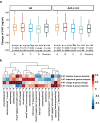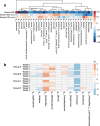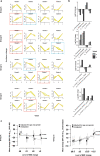Effects of dietary fibers or probiotics on functional constipation symptoms and roles of gut microbiota: a double-blinded randomized placebo trial
- PMID: 37078654
- PMCID: PMC10120550
- DOI: 10.1080/19490976.2023.2197837
Effects of dietary fibers or probiotics on functional constipation symptoms and roles of gut microbiota: a double-blinded randomized placebo trial
Abstract
Dietary fibers/probiotics may relieve constipation via optimizing gut microbiome, yet with limited trial-based evidences. We aimed to evaluate the effects of formulas with dietary fibers or probiotics on functional constipation symptoms, and to identify modulations of gut microbiota of relevance. We conducted a 4-week double-blinded randomized placebo-controlled trial in 250 adults with functional constipation. Intervention: A: polydextrose; B: psyllium husk; C: wheat bran + psyllium husk; D: Bifidobacterium animalis subsp. lactis HN019 + Lacticaseibacillus rhamnosus HN001; Placebo: maltodextrin. Oligosaccharides were also included in group A to D. 16S rRNA sequencing was used to assess the gut microbiota at weeks 0, 2, and 4. A total of 242 participants completed the study. No time-by-group effect was observed for bowel movement frequency (BMF), Bristol stool scale score (BSS), and degree of defecation straining (DDS), while BSS showed mean increases of 0.95-1.05 in group A to D (all P < 0.05), but not significantly changed in placebo (P = 0.170), and 4-week change of BSS showed similarly superior effects of the interventions as compared placebo. Group D showed a marginal reduction in plasma 5-hydroxytryptamine. Group A resulted in a higher Bifidobacterium abundance than placebo at week 2 and 4. Fourteen genera showed intervention-specific increasing or decreasing trends continuously, among which Anaerostipes showed increasing trends in groups B and C, associated with BMF increase. Random forest models identified specific baseline microbial genera panels predicting intervention responders. In conclusion, we found that the dietary fibers or probiotics may relieve hard stool, with intervention-specific changes in gut microbiota relevant to constipation relief. Baseline gut microbiota may predispose the intervention responsiveness. ClincialTrials.gov number, NCT04667884.
Keywords: Dietary fiber; functional constipation; gut microbiota; nutritional intervention; probiotics.
Plain language summary
What is the context?Supplementation of dietary fibers, such as psyllium husk or wheat bran (10 ~ 15 g/day) may relieve constipation symptoms, but bloating and flatulence are major concerns on a high fiber intake.Functional constipation patients had alternated gut microbiota profiles, while meta-analysis suggested that multispecies probiotics may increase bowel movement frequency and relieve hard stool in functional constipation.Dietary fibers or probiotics may lead to before-after changes of gut microbiota in patients with functional constipation, but time-series continued changes of gut microbiota during the intervention are unknown.Elevation of 5-hydroxytryptamine synthesis in enterochromaffin cells may affect bowel movement. And the elevated plasma 5-hydroxytryptamine was observed in functional constipation patients.What is new? Daily supplement of three prebiotic formulas with dietary fibers (polydextrose, psyllium husk, wheat bran, together with oligosaccharides), or a probiotic formula with Bifidobacterium animalis subsp. lactis HN019 + Lacticaseibacillus rhamnosus HN001 effectively relieved hard stool in functional constipation patients after 4 weeks intervention.We identified continued increasing or decreasing gut microbial genera over the intervention. Dietary fiber – gut microbiota (Anaerostipes)—constipation relieve (bowel movement frequency) evidence axis was identified in this human trial.Probiotic supplementation marginally reduced plasma 5-hydroxytryptamine, possibly associated with changes in BMF-related gut microbial genera.Intervention-specific baseline gut microbiota well predicted the responsiveness of constipation symptom relief.What is the impact? We provided references for the dosage and duration of dietary fiber/probiotics recommendations for adults with functional constipation, and advanced the microbial genera evidences of the fibers/probiotics-microbiota-laxation theory in humans.
Conflict of interest statement
BYHEALTH Co., LTD provided the dietary fiber and probiotic supplements in this study.
Figures






Similar articles
-
Effects of 28-day Bifidobacterium animalis subsp. lactis HN019 supplementation on colonic transit time and gastrointestinal symptoms in adults with functional constipation: A double-blind, randomized, placebo-controlled, and dose-ranging trial.Gut Microbes. 2018;9(3):236-251. doi: 10.1080/19490976.2017.1412908. Epub 2018 Feb 8. Gut Microbes. 2018. PMID: 29227175 Free PMC article. Clinical Trial.
-
Effect of Bifidobacterium animalis subsp. lactis MN-Gup on constipation and the composition of gut microbiota.Benef Microbes. 2021 Feb 24;12(1):31-42. doi: 10.3920/BM2020.0023. Epub 2020 Dec 14. Benef Microbes. 2021. PMID: 33308038 Clinical Trial.
-
Eight-Week Supplementation With Bifidobacterium lactis HN019 and Functional Constipation: A Randomized Clinical Trial.JAMA Netw Open. 2024 Oct 1;7(10):e2436888. doi: 10.1001/jamanetworkopen.2024.36888. JAMA Netw Open. 2024. PMID: 39356506 Free PMC article. Clinical Trial.
-
Meta-analysis of randomized controlled trials of the effects of probiotics on functional constipation in adults.Clin Nutr. 2020 Oct;39(10):2960-2969. doi: 10.1016/j.clnu.2020.01.005. Epub 2020 Jan 14. Clin Nutr. 2020. PMID: 32005532
-
Targeting patients' microbiota with probiotics and natural fibers in adults and children with constipation.Eur Rev Med Pharmacol Sci. 2018 Oct;22(20):7045-7057. doi: 10.26355/eurrev_201810_16177. Eur Rev Med Pharmacol Sci. 2018. PMID: 30402873 Review.
Cited by
-
Current insights into genome-based personalized nutrition technology: a patent review.Front Nutr. 2024 Jan 22;11:1346144. doi: 10.3389/fnut.2024.1346144. eCollection 2024. Front Nutr. 2024. PMID: 38318472 Free PMC article. Review.
-
The gut microbiome and metabolites are altered and interrelated in patients with functional constipation.Front Microbiol. 2023 Dec 6;14:1320567. doi: 10.3389/fmicb.2023.1320567. eCollection 2023. Front Microbiol. 2023. PMID: 38125567 Free PMC article.
-
Metabolites in the Dance: Deciphering Gut-Microbiota-Mediated Metabolic Reprogramming of the Breast Tumor Microenvironment.Cancers (Basel). 2024 Dec 11;16(24):4132. doi: 10.3390/cancers16244132. Cancers (Basel). 2024. PMID: 39766032 Free PMC article. Review.
-
New Insights into a Conceptual Bionic Colonic Bioreactor: A Model, 'Probiotics in Human Colon', Showing How Probiotics Alleviate Constipation from a Bioprocess Engineering Perspective.Foods. 2025 Apr 12;14(8):1335. doi: 10.3390/foods14081335. Foods. 2025. PMID: 40282737 Free PMC article. Review.
-
Dietary intake of live microbes mitigates the mortality risk associated with sedentary behavior in US hypertensive individuals.Sci Rep. 2025 May 12;15(1):16483. doi: 10.1038/s41598-025-01122-y. Sci Rep. 2025. PMID: 40355534 Free PMC article.
References
Publication types
MeSH terms
Substances
Associated data
LinkOut - more resources
Full Text Sources
Medical
